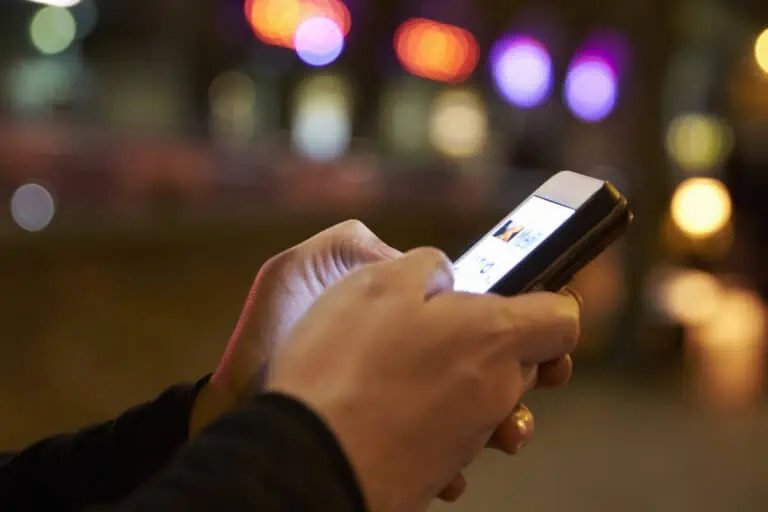The need to stay connected becomes a physical and emotional need
Technology has brought great benefits to our lives; let’s just think about what the experience of lockdown and distancing would have been like without the possibility of staying connected, working or following lessons from home, and video calling friends and relatives.
For years now, thanks to smartphones, most of us are always reachable and connected at any place or time of day.
This attachment to the smartphone, to always being reachable and connected, leads us to no longer be able to do without our mobile phone and internet connection.
There have been numerous surveys and studies to understand how much this new need is felt by the population: in 2015, in an interview with Il Fatto Quotidiano [1], a group of people were asked if they had managed to live without a smartphone. Most of the interviewees answered no, that if they were to be without a cell phone, “they would get anxious”. A famous study conducted by Samsung in 2019 [2] involving more than 6,500 respondents, however, showed that 36% of Italians would prefer to receive a battery recharge rather than borrowed money.
The phenomenon is so vast that it has been given a name: Nomophobia, or Disconnection Syndrome.
Nomophobia: what is it?
The term is composed of an Anglo-Saxon term (No-mo, abbreviation of no-mobile) and the suffix phobia, and indicates the fear of being disconnected with a consequent actual dependence on the smartphone.
People with nomophobia panic when they realize they have left their mobile phone at home, constantly check notifications on their smartphone, hear their phone vibrate or ring when it is not ringing or vibrating, and take their mobile device with them everywhere, even in inappropriate places.
Nomophobia can become a full-fledged addiction, acting in a similar way to all other addictions and therefore affecting different aspects of individuals’ lives. Starting from states of anxiety due to low battery, uncontrolled agitation when you are unreachable or when loved ones are not, you even get to avoid places where the signal is poor, or where you do not have the possibility to keep charge your cell phone, such as a beach or the mountain[3].
Nomophobia is a form of addiction that affects many aspects of the life of those who suffer from it until it becomes a real pathology. The pathological form of smartphone addiction leads people who suffer from it to anxiety states at the mere thought of staying disconnected or with the phone empty. But are these only extreme cases, or can we all recognize ourselves somewhat in these aspects, even if in a milder form?
Are we all nomophobic?
Who hasn’t never left the house without a smartphone, or been angry with a friend or partner because they weren’t reachable all day? Or spend hours on social media and start worrying when your smartphone battery is less than 20% and we don’t have a charger available? Is this also nomophobia?
Even if the smartphone is part of our lives, for most of us, “cell phone addiction” is not a disease. However, it is still an aspect that influences our lives: we give up going on a night out because our mobile phone is flat, we avoid places where we know we are unreachable, between two similar places we prefer the one that offers a Wi-Fi connection and, in our travel, we always give priority to places where we know we have the possibility to recharge our smartphone.
This is why the phenomenon of power bank sharing, with mobile and totems charging stations in shops, offices and shopping centers, and the possibility of renting power banks on the go, is gaining more and more importance in today’s world.
Offering the Wi-Fi connection but also the possibility of recharging your mobile phone is becoming a fundamental element of the quality of service of shopping centers, small shops, service providers, restaurants, clubs, and any other type of commercial activity present in the area.
Recharging your smartphone becomes an emotional need
Although the word nomophobia contains the suffix “phobia” which refers to a form of fear or anxiety, nomophobia is more like a real addiction. Even if most of us will never develop the real “disconnection anxiety” pathology, many of us recognize ourselves in this sort of smartphone addiction.
We all know that we can survive a day without smartphones, but we don’t like the idea. We are so used to having the world of the web and communications at our fingertips that just the idea of being without it disorients us.
In this sense, having the possibility to recharge your smartphone everywhere becomes an emotional need. People feel safer in places where they have a power bank close at hand.
Charging stations, and more generally powerbank sharing, in places open to the public perform the function of offering a service that responds to a need that has become indispensable, but also of emotional reliability towards customers or users of a commercial activity .
[1] Nomofobia, psichiatra: “La dipendenza da smartphone fa perdere controllo realtà” | Il Fatto Quotidiano
[2] Mai più senza ricarica dello smartphone | News Samsung
[3] Smartphone che passione…..o che malattia?! La nomofobia | State Of Mind
